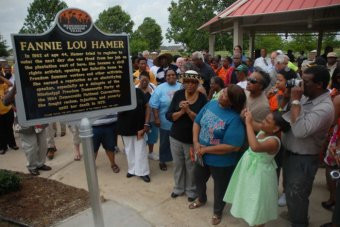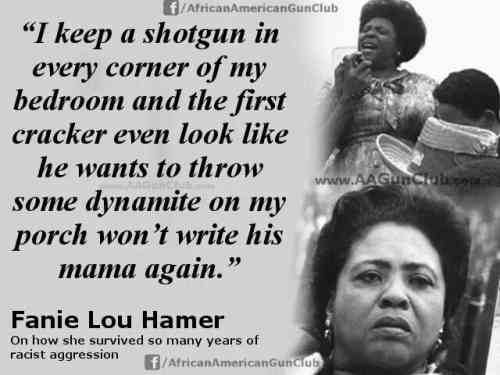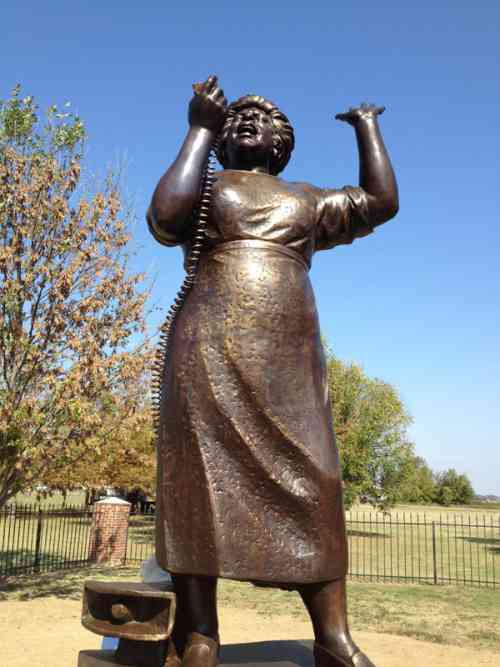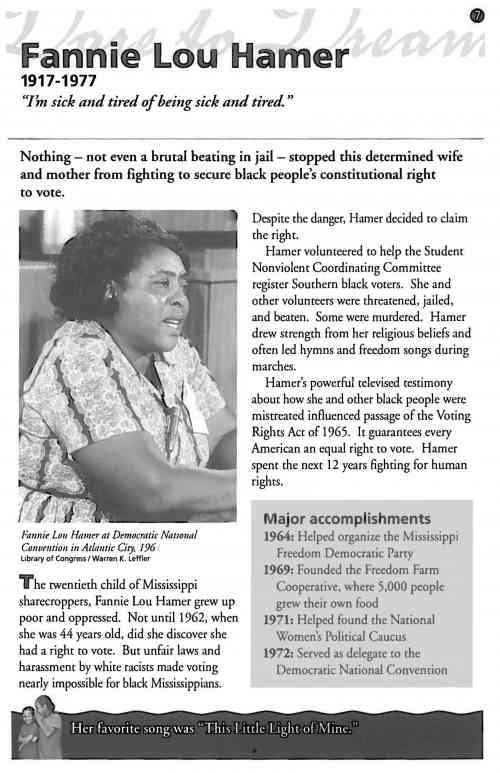Tuesday Open Thread: Fannie Lou Hamer editon

Delegates to the 1964 Democratic Convention heard an extraordinary speech by a woman who went on to match Martin Luther King Jr as a civil rights leader. She demanded the right of African Americans to be included in civic life, and it shook her nation.

Fannie Lou Hamer's 1964 Civil Rights Speech
I have just finished reading AMERICAN PROPHETS: seven religious radicals & their struggle for social and political justice. This powerful book puts to rest the clearly incorrect view that "people of faith" should be written off as ignorant and intolerant and dangerous folks that progressives should avoid avoid at all costs. As the subtitle indicates, the book looks carefully at the lives of seven individuals who have be part of the ninety-nine percent since long before any of us thought of the designation.
Today's open thread focuses our gaze upon one of those seven. Fannie Lou Hamer is probably the least know of the seven. But she is most certainly not the least important.
From Gil Scott Heron, A MESSAGE TO THE MESSENGERS
Fannie Lou Hamer's life took a dramatic turn the day she showed up for a mass meeting to learn about voting. It was August 1962 and Hamer, who was forty-four years old, wasn't even sure what a "mass meeting" was. "I was just curious to go, so I did," she said.1 The meeting was organized by the Student Nonviolent Coordinating Committee (SNCC) and Hamer was told something she'd never heard before: black people had the right to vote.
Testimony Before the Credentials Committee, Democratic National Convention
Atlantic City, New Jersey - August 22, 1964
According to biographer Sina Dubovoy, when Hamer heard SNCC's presentation, she asked herself, "What did she really have? Not even security." A lynching in a nearby town in 1904 had terrorized blacks then, and the ever-present KKK still kept them quiet. As Dubovoy notes, "The Mississippi Delta was the world's most oppressive place to live if you were black."2 Hamer decided on the spot to register to vote. On August 31, 1962, she boarded a bus to Indianola with seventeen others to try to register to vote. The next day she was kicked off the plantation where she had lived and worked for eighteen years. Her husband lost his job, too.Hamer immediately went to work as a field organizer for SNCC. Returning home from a training workshop in June 1963, Hamer's bus was intercepted by policemen. She and two others were taken to jail in Winona, Mississippi, and mercilessly beaten. Hamer suffered permanent damage to her kidneys. After recovering from her injuries, she traveled across the U.S. telling her story. With her genuine, plainspoken style, Hamer raised more money for SNCC than any other member.
In 1964, with the support of the Mississippi Freedom Democratic Party (MFDP), Hamer ran for Congress. The incumbent was a white man who had been elected to office twelve times. In an interview with the Nation, Hamer said, "I'm showing the people that a Negro can run for office." The reporter observed: "Her deep, powerful voice shakes the air as she sits on the porch or inside, talking to friends, relatives and neighbors who drop by on the one day each week when she is not campaigning. Whatever she is talking about soon becomes an impassioned plea for a change in the system that exploits the Delta Negroes. 'All my life I've been sick and tired,' she shakes her head. 'Now I'm sick and tired of being sick and tired.'"
She bows down to no man.

LBJ dispatched Hubert Humphrey and Walter Ruther and Walter Monday, three well know liberals, to suggest that they accept two non-voting seats as a compromise to her demand that the MFDP delegation be seated at the party convention.
This is her reply:
Senator Humphrey, I been praying about you, and I been thinking about you, and you're a good man, and you know what's right. The Trouble is, you're afraid to do what you know is right.You just want this job. I lost my job. Do you mean to tell me that your position is more important than four hundred thousand black people's lives?
Senator Humphrey, I know lots of people in Mississippi who have lost their jobs trying to register to vote. I had to leave the plantation where I worked in Sunflower County, Mississippi. Now if you lose this job of Vice-President because you do what is right, because you help the MFDP, everything will be all right. God will take care of you. But if you take this job, why, you will never be able to do any good for civil rights, for poor people, for peace, or any of those things you talk about. Senator Humphrey, I am going to pray to Jesus for you.
After heated discussion, the group rejected the offer, contrary to the advice of Martin Luther King Jr., Bayard Rustin, and a patronizing Roy Wilkins, executive secretary of the NAACP, all of whom defended the compromise as a "symbolic victory." As Hamer put it, "we didn't come all this way for no two seats.
Meanwhile, all but three of the regular Mississippi delegation abandoned the convention rather than swear allegiance to the party ticket at platform. With credentials given to them by friendly delegates from other states, several of the MFDP delegates, including Hamer, attempted to take the empty seats but were ousted by security guards - as the whole scene was captured on national television.
On March 7, 1965, state troopers knocked down, gassed, and beat a number of men and women who were participating in a peaceful march for voting rights in Selma, Alabama. That same day, radio listeners around the country might have heard Sam Cooke singing a lyric he’d written and recorded several months earlier, but which could have been describing the "Bloody Sunday" confrontation on the Edmond Pettus Bridge.
I was born by the river in a little tent
Oh, and just like the river I've been running ever sinceIt's been a long, a long time coming
But I know a change gon' come, oh yes it willIt's been too hard living, but I'm afraid to die
'Cause I don't know what's up there beyond the skyIt's been a long, a long time coming
But I know a change gon' come, oh yes it willI go to the movie and I go down town
Somebody keep telling me don't hang aroundIt's been a long, a long time coming
But I know a change gon' come, oh yes it willThen I go to my brother
And I say, "Brother, help me please."
But he winds up knockin' me
Back down on my kneesThere been times that I thought I couldn't last for long
But now I think I'm able to carry onIt's been a long, a long time coming
But I know a change gon' come, oh yes it will“Change” delivers a message notably distinct from Dylan’s in “Blowin’ in the Wind.” On the recording, Dylan is obviously concerned about the troubles he’s addressing, but his flat delivery conveys none of the urgency, hope, or confidence that are so paramount in Cooke’s performance. Soon afterward, Dylan would write “Only a Pawn in Their Game,” in response to the murder of Medgar Evers, and he would travel to Greenwood, Mississippi, in support of voter registration, and perform at the March on Washington for Jobs and Freedom. But the Dylan of “Blowin’ in the Wind” muses over important issues from a third-person distance that Cooke’s song (“I was born by the river…”) eschews from the jump. Dylan poses philosophical musings and rhetorical questions amid antiquated word choices (in the days of “Ban the Bomb,” he’s going on about “cannonballs”), geological time frames (those washed-to-the-sea mountains), and Old Testament allusions. “Blowin’ in the Wind” intimates that the answers we crave are where they have always been and where, tragically, they may well remain. “A Change Is Gonna Come” is unequivocal.If Sam Cooke were alive to update “A Change Is Gonna Come” for the current political scene, he might be tempted to rename it “The More Things Change.”
THE NEW YORKER March 17, 2015The PFC Band's "Back To Your Roots" tour played venues across North America in the Spring of 2012. This performance of "A Change is Gonna Come" was one of the highlights of an amazing show, Live at Folsom, CA. Grandpa may be a blind man, but he sees the light!
[video:https://youtu.be/H76eYvsNdLM]
[video:https://youtu.be/CxTReRmH2jA?t=10]
[video:https://vimeo.com/98770370]
[video:https://vimeo.com/132350974]
[video: https://youtu.be/R11bxvt-ut4?t=6 ]
[video:https://vimeo.com/154736778]
[video:https://vimeo.com/163552161]
As Tavis Smiley likes to say, "keep the faith!" See you next week.





Comments
Good morning, philly. Thanks for the OT and the tribute to
Ms Hamer She was a hero and a force to be reckoned with.
That, in its essence, is fascism--ownership of government by an individual, by a group, or by any other controlling private power. -- Franklin D. Roosevelt --
Hamer would no doubt be Gitmo'd or called a race-baiter today.
It's a shame that almost nothing has changed today, save that a few women, LGBT and people of color are allowed to serve as tokens in the Empire for the preservation of capitalism.
Modern education is little more than toeing the line for the capitalist pigs.
Guerrilla Liberalism won't liberate the US or the world from the iron fist of capital.
Hamer was a real hero
Whose work is still well remembered here in Alabama. A woman who worked with her spoke the other week at the PPC in Montgomery.
Seems we have gone backwards. It is time to make progress, but I don't see it.
Thanks for the tribute to Fannie Lou.
“Until justice rolls down like water and righteousness like a mighty stream.”
Feels good to be writing again...
And doing physical activity, which I hated when i did it for a living, but love it now that I'm doing it for my life. (Family has a history of heart attacks, and I'd like to live more than 10 more years, thanks.)
And my last Meta Comment about things on the site, I promise:
[video:https://www.youtube.com/watch?v=_QyYaPWasos]
I do not pretend I know what I do not know.
First the Warriors, now the Eagles
I see a pattern